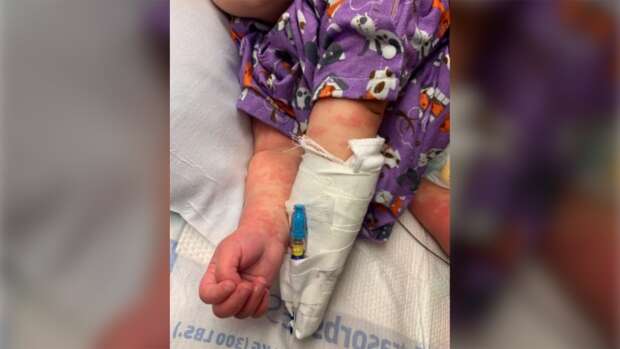Shomporko Desk: Ontario has seen no more than two dozen cases of an uncommon provocative disorder in children perhaps connected to earlier COVID-19 disease, doctors at Sick Kids Hospital said Tuesday.
In the United States and Europe, caution was brought prior up in the pandemic as kids regularly with no hidden ailments were brought to hospital experiencing the serious expansion of furthest points, delayed high fever, and bloodshot eyes.
In the U.S., at least 3 of the cases diagnosed had been fatal.
But due to the fact that the start of the outbreak, Dr. Jeremy Friedman of Sick Kids Hospital says doctors have handled 24 children for signs and symptoms regular with the disease, and none of them have tested high quality for COVID-19 the use of the nasal swab PCR test.

“We’ve not seen a severe shock or hyper-inflammatory symptoms that need ICU admission,” Friedman said.
He added that all the children recovered easily with treatment using an intravenously-delivered steroid or just aspirin.
While the children tested negative using the PCR test, which detects the active presence of the virus, they have not tested the children’s blood for the presence of antibodies indicating a prior resolved COVID-19 infection.
Friedman says the hospital is still waiting for “approval” to conduct blood tests to look for COVID-19 antibodies.
It is believed the disease occurs as a result of an “overzealous delayed immune response,” from the child’s body to the presence of the novel coronavirus, Friedman said.

A total of 1,441 people aged 19 or younger have tested positive for COVID-19 since the outbreak reached Ontario in late January.
Friedman said that Sick Kids has tested more than 5,000 children for COVID-19 since the outbreak began.
Of those, less than 30 kids came back positive, and only seven required admission for treatment of the virus.
The low incidence of the syndrome is just one of many themes doctors at Sick Kids have identified that indicate the impact of COVID-19 is lower on children than adults, as they encourage the province to get schools back up running in September.
“Generally what we see is that children get infected from adults, not the other way around,” Cohn said, stressing that conclusion is preliminary and will require much more study in the coming months.
They also say that the continued isolation of children from their friends and activities could pose a greater risk to their mental health than the risk of possible exposure to the virus.
“The impact on mental health, developmental and behavioural health of children not going to school – is something that myself and many of my colleagues in pediatrics are literally losing sleepover,” Cohn said Wednesday.
The hospital’s guidelines released Wednesday encourage schools to limit large gatherings such as assemblies, but say play on the playground, even the type that doesn’t involve distancing, is okay.
The hospital’s experts do not advise schools to take everyone’s temperature upon entry, saying that fever only presents in 50 per cent of symptomatic cases. But anyone with symptoms should stay home and get tested as soon as possible.
They also say masks are not needed for students and teachers at school. Ontario’s Ministry of Education tasked Sick Kids Hospital with developing guidelines for the resumption of school and childcare last month.
Speaking about Sick Kids’ guidelines, Ontario Premier Doug Ford said the province would listen to what the hospital’s doctors are recommending.
“They’re the experts, the health teams are the experts – if they think the green light’s good to go we’re going to follow their lead and we’re going to put in really stringent protocols,” he said.
Photo credit: CTV NEWS
News source: CP24











